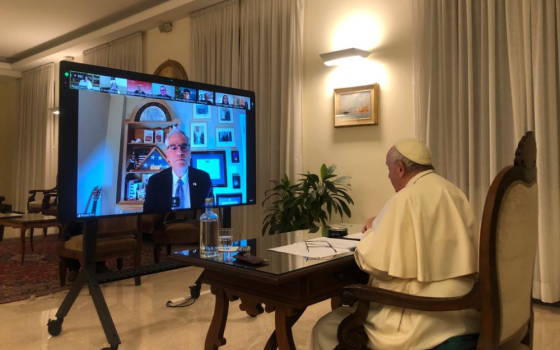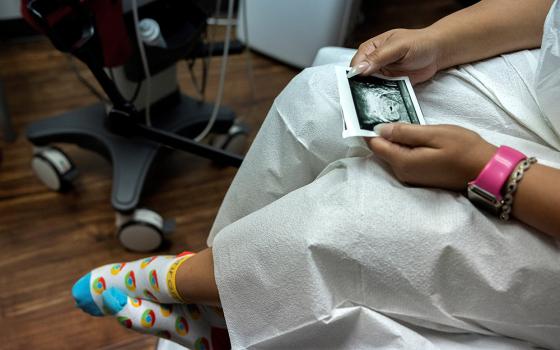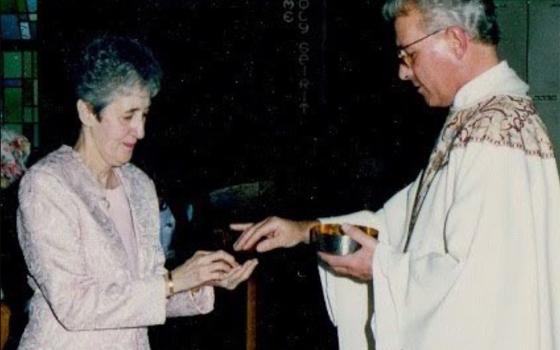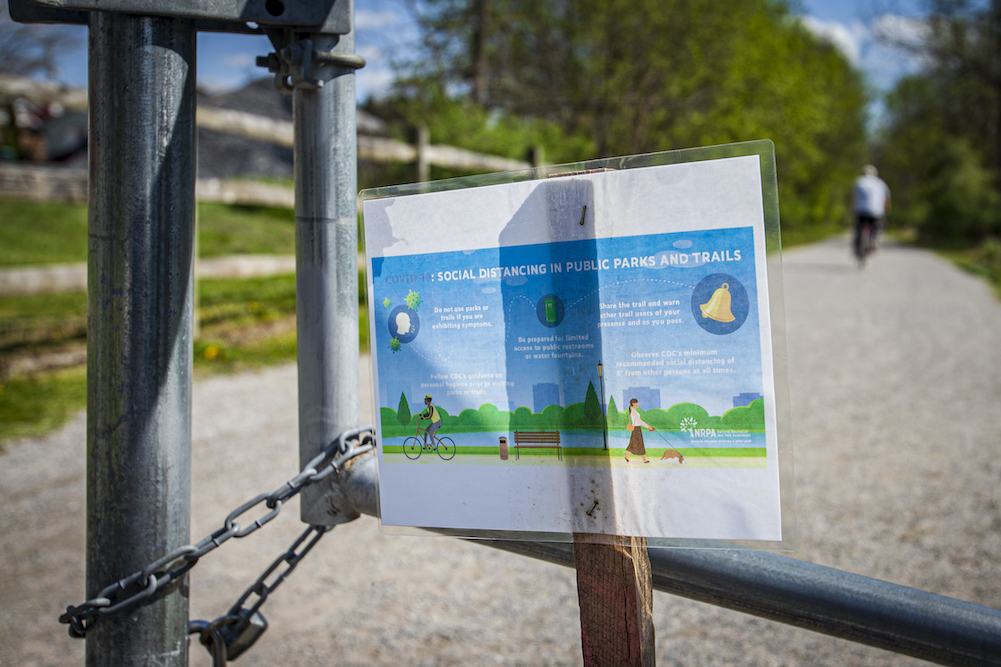
A sign detailing how to adhere to social distance rules is seen as a man rides his bicycle May 3 along the Saucon Rail Trail near Hellertown, Pennsylvania, amid the coronavirus pandemic. (CNS/Chaz Muth)
"Dime con quién andas y te diré quién eres." This often-cited aphorism in Spanish has much to say about what it means to be human. It affirms that if we want to know who we are, we must question the communal relations and persons that define our daily life. In other words, "Tell me with whom you walk, and I will tell you who you are." In Latinx theology, this relational anthropology is rooted in a recognition that community is the birthplace of the self.
Our world has changed much in these past months, especially as a result of COVID-19. The tectonic shifts that have put in place the practice of "social distancing," keep us from literally "walking with" friends, loved ones and co-workers at the present moment. The signs of the times invite us to reconsider the nature of the socially constituted self and the ethical demands the practice of social distancing raises for each of us.
Social distancing creates possibilities for expanding our capacity to "walk with" others.
Paradoxically, social distancing has made us more "catholic," that is, more aware of the global nature of our human family. It has deepened our awareness that we are social creatures and need one another. It has made us more mindful of the inter-dependence and fragility of all life. Because the virus knows no borders, we have become much more attuned to our common humanity and how those that live beyond our cities, states and national borders share in our present and future. Moreover, practicing social distancing for the sake of protecting our most vulnerable populations has broadened our consciousness with respect to particular persons woven into our daily living — a grandparent, a child, an elderly neighbor, a cancer survivor, a person who is homeless.
Advertisement
The spread of the virus also expands our notions of life. It speaks volumes to the integral ecology of life that Pope Francis has tirelessly proclaimed. The pope has cautioned, as a result of this integral ecology, our ecological crisis is inherently connected with unethical human actions that impact most especially those who are poor. In an article for Mother Jones, Yvette Cabrera summarizes these connections succinctly, "The COVID-19 pandemic is not just a health crisis, it's an environmental justice crisis. … the hardest hit populations are found in areas that are also overburdened by pollution, poverty, and illnesses such as obesity, diabetes, and cancer, as well as asthma and cardiovascular disease."
Social distancing provides a most fitting moment to ask ourselves: Whom have we failed to walk-with prior to COVID-19?
It is no secret that COVID-19 has brought to light numerous persons and communities that were already experiencing social distancing on the basis of socio-economic conditions, race, ethnicity, gender identity, sexual orientation, physical ability, immigration status and the like. Racial disparities cannot be underestimated nor can the disproportionate toll on black communities be ignored. Scholar and activist Keeanga-Yamahtta Taylor in The New Yorker observes that there is "a new, morbid twist" on the old African American aphorism "When white America catches a cold, black America gets pneumonia … when white America catches the novel coronavirus, black Americans die." Sadly, those who were already socially distant as a result of living in unhealthy environments, those lacking proper access to health care and those who were socio-economically marginalized have been the most impacted by this pandemic.
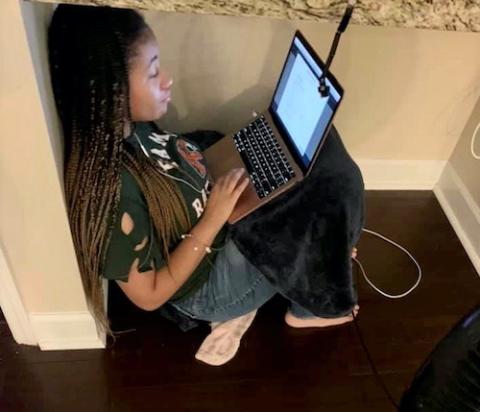
Amerie Ellis, 14, studies on her laptop during a March 31 homeschooling session at her Tallahassee, Florida, home. (CNS/USA Today Network/Reuters/Shaia Simmons)
These issues of social inequality must renew our efforts to address how power and privilege impact human relationships, either through inclusion or exclusion of particular persons. This temporary disruption of our "normal" and "productive" lives needs to create possibilities for the eruption of new and more inclusive ways of walking with others. There cannot be a return to business as usual, despite what our leaders would have us think.
The socially constructed, accepted, sustained and so-called "normal" has been bought at a great price for too many of our excluded neighbors. Let me be perfectly clear: "Normal" is what has kept us from walking with others, paralyzing our ability to address the needs of our most vulnerable neighbors. Before we were sheltering in place, we were already sheltering ourselves from others. Misguided and unjust social and cultural ways of accompaniment keep us at more than an arm's length from each other, especially from those most in need. Thus, a return to "normal" cannot simply be a return to what has already proven itself to be bankrupt. The only business as usual we should accept as Christians is a radical ethos that puts our common humanity first, that challenges socially destructive actions to exclude and marginalize and that propels us instead to heal our communities by ridding ourselves of institutionalized social illnesses plaguing so many of our neighbors.
Social distancing creates new possibilities of "walking" virtually with others within and beyond our national borders in efforts to bridge human differences and birth just ways of being human.
As a parent and teacher, I confess I, too, have resonated with the critique that the Gen Z generation spends too much time in front of screens — computers, tablets, cell phones — and not enough time in embodied "face to face" interactions. My own kids and I have had many conversations on this subject. I have expressed concern about potential emotional and psychophysical consequences that might arise from practices that can appear to be self-imposed "social distancing."
While psychological studies have pointed out the importance of touch and physical relationships for healthy human development, truth be told, the verdict from scientists on the benefits and drawbacks of virtual relationships is not yet out. More recent studies indicate that our brains have an amazing capacity to adjust to virtual touch, with findings suggesting that "as the new rules of social interaction become part of your reality, your brain may react in ways that can actually provide you with at least some consolation."
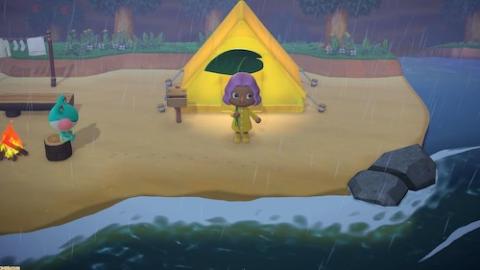
Scene from the video game "Animal Crossing: New Horizons." (CNS/Nintendo)
I asked my daughter Ana, a reporter covering video games and gaming culture, her thoughts regarding her generation's ability to handle the kind of social distancing we are currently practicing. Ana's response was perceptive and underscores how some interactions in virtual space, including video games, can shape character formation, encourage moral agency and contribute positively to the social constitution of the self.
Ana noted, as an example, the social simulation video game "Animal Crossing," one that has increased in popularity during the pandemic. Playing offers gamers the possibility to relate to friends through richly imaginative interactions. It opens up a safe space that can respond to the physical alienation and anxieties that many young persons are experiencing as a result of social distancing from their friends. Upon further pressing my daughter as to what makes this kind of "relating" in virtual space communally meaningful, Ana offered me an unexpected but much welcome response:
Video games are crucial to getting through the pandemic because they facilitate the growth of online cultures. Games give us rituals, customs, and events that are designed for the Internet, when we are no longer able to participate in our old rituals. Finally, another thing that is important to this conversation is performance of identities. Some people play Animal Crossing and make a character that looks nothing like them as an opportunity to identify with and visually perform a different identity.
These observations run counter to the idea that online relationships "distance us" from the practice of knowing and caring for our neighbors. Some might argue that a virtual character is not a real person. Others might point out how the coronavirus has also revealed social disparities when it comes to access to technology. Still, notwithstanding these valuable insights, the latter does not dismiss the symbolic richness and potential of virtual space interactions to shape notions of identity, community and relationships. If social distancing becomes more the rule than the exception, we will need to turn more and more to the youth for advice on creating new symbolic realities and rituals capable of instilling the values of empathy and care for all of creation.
During this time of Easter, we Christians proclaim the resurrection of Christ's body. Jesus did not simply come back to life. God, the loving caregiver of all creation, raised and transformed Jesus' body into a new way of existing. As the Gospels make clear, he "walked with" others in a transformed way. Easter is all about transformation. In this year in particular, it is about transforming what too many of us had come to accept as "normal."
So, during this Easter season, let us turn social distancing into an opportunity to expand our circle of relationships. Let us care for the least of our brothers and sisters, already kept distant as a result of social injustices. Let us "walk" together as kin and neighbors in whatever creative ways we can imagine, and, when the appropriate time comes, let us step into justice to birth new ways of being human.
[Miguel H. Díaz is the John Courtney Murray University Chair in Public Service at Loyola University in Chicago. He was ambassador to the Holy See during the first administration of President Barack Obama.]
Editor's note: We can send you an email alert every time a Theology en la Plaza column is posted to NCRonline.org. Go to this page and follow directions: Email alert sign-up.




